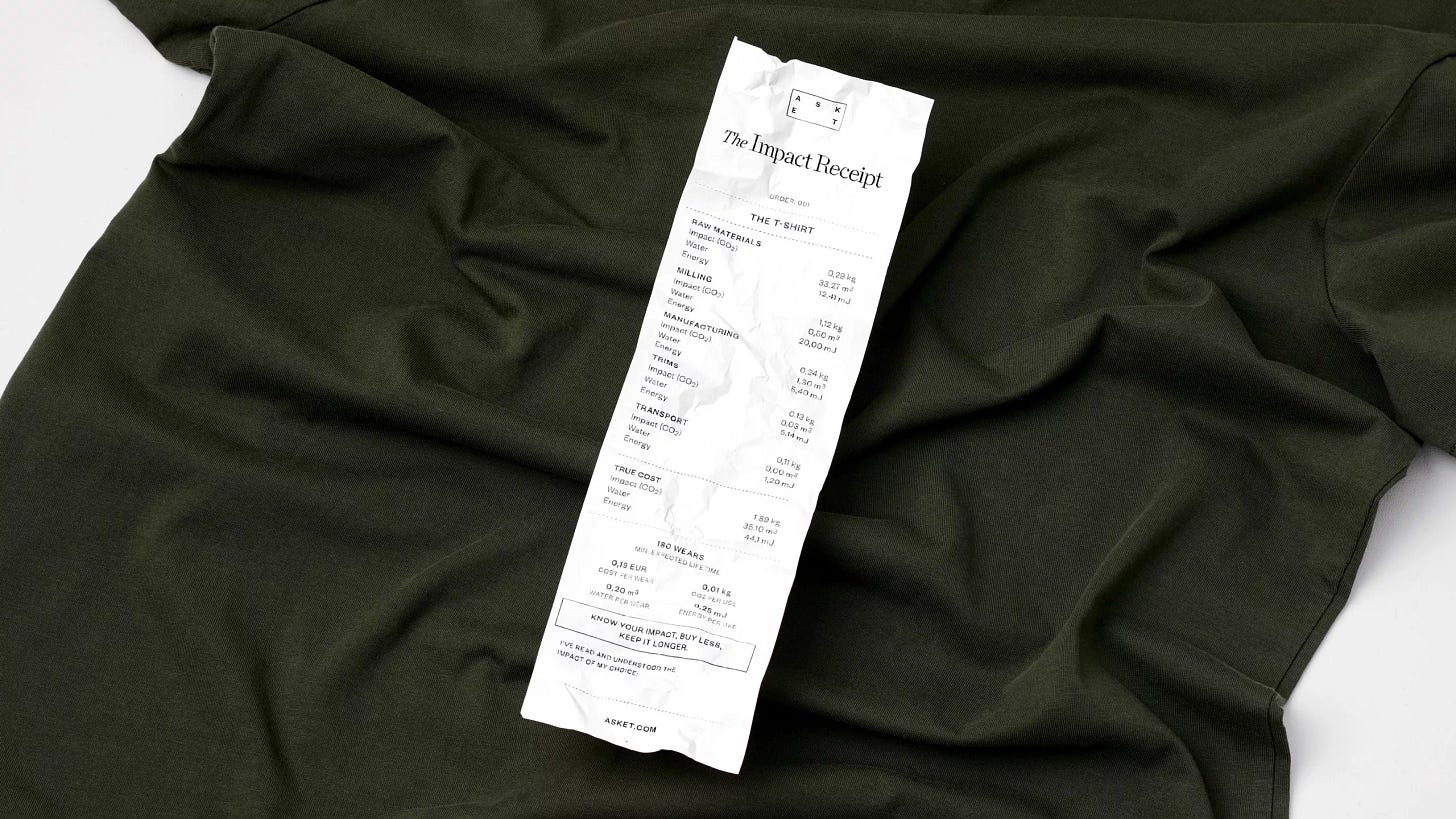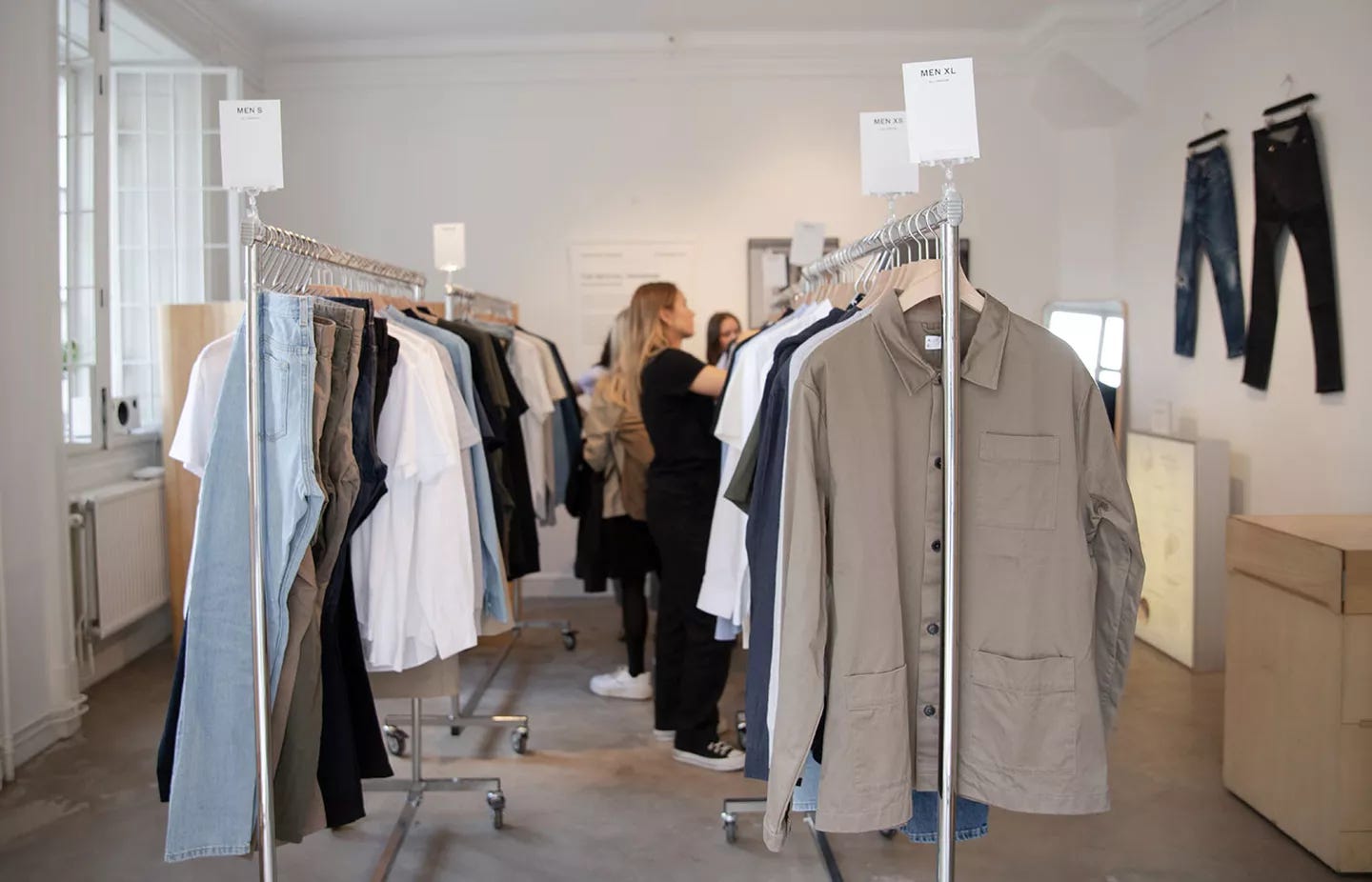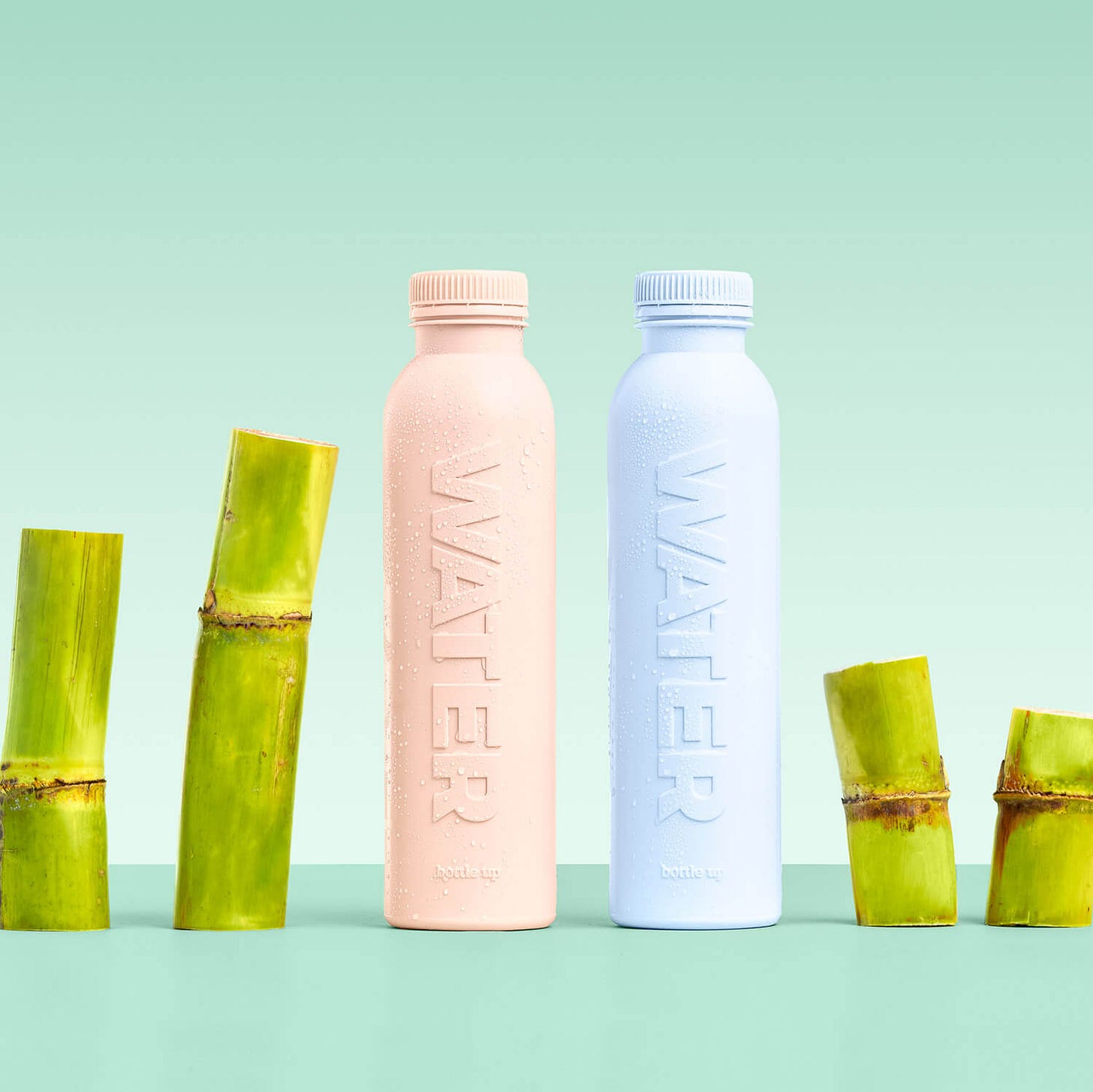🌱 Why Asket paused the release of new products, and we dig into degrowth ahead of Earth Overshoot Day.
Featuring Asket, Biokaiser, Lamazuna, Fairphone, H!P Chocolate and more...
Happy Monday!
This week we cover:
Quick Take: Earth Overshoot Day: Is degrowth within business even possible?
Brand Spotlight: In Pursuit of Less: Why Asket paused the release of new products.
In case you missed it: 🌱 Plastic Overshoot Day, and how BottleUp have swapped single use for sugarcane.
> Good News Last Week
🎯 H!P Chocolate announced that they are the one of the sponsors for the Ocean Warrior Resolute Expedition, measuring the impact of climate change on the Arctic waters.
🎯 Finisterre announced that they are launching their first-ever Yulex LLC Wetsuit Rental Programme, enabling people to test the performance and eventually making the switch to a more environmentally and socially responsible alternative to neoprene.
⭐️ Morrisons announced that they are trialling recycling points for coffee machine pods in partnership with Podback, the pod recycling service, in 29 stores.
⭐️ PepsiCo announced that it has scaled the use of hydrotreated vegetable oil (HVO) - used cooking oil - fuel across its supply chain, saving 2,650 tonnes in greenhouse gas emissions annually.
⭐️ Amazon announced that they will update their Supply Chain Standards next year, requiring their suppliers to report their carbon emissions data to the company and improving their Scope 3 emissions data.
⭐️ Müller launched its first vegan products in the UK on their two most popular products, corner yogurts and rice pudding, which are coconut-based.
> Click on each link to read more.
> Quick Take
Earth Overshoot Day: Is degrowth within business even possible?
Degrowth. The enemy of capitalism or the most viable way forward for our planet…or both?
Degrowth is a concept that was coined by André Gorz in 1972 and can be defined as “a planned reduction of energy and resource use designed to bring the economy back into balance with the living world in a way that reduces inequality and improves human well-being”. It’s fundamentally rooted in the ambition to balance economics with our planetary boundaries.
This concept, often defined as “radical”, is becoming increasingly critical to embed in society as Earth Overshoot Day creeps forward each year. This year, Earth Overshoot Day is Wednesday 2nd August, when “humanity’s demand for resources and services in a given year exceeds what Earth can regenerate in that year” - demand that’s largely driven by the Global North. For the five months that follow, we will be collectively pushing Mother Earth past her planetary boundaries. With this date creeping earlier and earlier, business-as-usual cannot stand on its own two feet.
We have used Gross Domestic Product (GDP) as a key indicator of progress and human well-being for decades, despite warnings against that from its creator. Using this metric has led to the assumption that grand challenges like poverty, starvation, and homelessness can be solved by economic growth. However, this approach will only force Earth Overshoot Day to slip further, as carbon emissions increase, soil is eroded, our waters are polluted and the ‘era of global boiling’ takes shape.
The key to unlocking the possibilities of degrowth is to change mental models. Degrowth largely needs to take place at the societal level and be supported by policies and standards. However, businesses can help, too, by adopting a degrowth paradigm.
Some characteristics that experts say show businesses are following a degrowth paradigm include:
Alternative understandings of business.
Collaborative value creation.
Democratic governance.
Making products that last and are repairable.
Moving from business activity to activism and social movement.
Corporate leaders’ commitment to company values in their personal life.
Reduction of environmental impacts at all stages of the product/service life-cycle.
The concept of degrowth has many similarities to sustainability practices. However, it may be a departure for those who see sustainability as only a way of improving our existing system.
One of the reasons degrowth can be scary is because examples of its presence and success in modern society are hard to come by. How can we be expected to adopt a business model we aren’t sure even works?
However, examples of successful FMCG companies that are following a degrowth paradigm do exist, and they’re doing it well:
Biokaiser is a German chain of bakeries that prioritises producing quality products while treating nature and people with care. The company describes itself as one where “not only the products, but above all the people in their differences and diversity are valued.”
Lamazuna, a French personal goods company, caps its workforce at 150 employees, understanding there is no need for it to grow exponentially. The company also offers clear guidelines for what to do with each of their products to give them a second life.
Fairphone, a personal tech company, prioritises the possibility of repairing its products so that consumers have to purchase as infrequently as possible. This practice is a far step from Apple, which aims to convince consumers they need a new cell phone every September. Fairphone is on a mission toward “changing the electronics industry from the inside.”
We’ve also loved this article from Vogue Business which digs into what degrowth could mean for the fashion industry in particular, and how it could take shape.
Economist Herman Daly told us in 1993 that “in a finite world continual growth is impossible.” Acceptance of and adaptation to this is becoming increasingly critical. Where do we start in changing the system? Our relationships with others are key. Indigenous concepts such as Ubuntu, which calls for the individual to act with responsibility, care, and harmony towards others, are on the right track and can be greatly learned from. So, this Earth Overshoot Day, are there areas of your business that could thrive with a fundamental shift in mindset?
> Brand Spotlight
In Pursuit of Less: Why Asket paused the release of new products.
‘The world doesn’t need another fashion brand. And certainly doesn’t need more clothing.’
We wouldn’t blame you if you guessed these words were a criticism of, rather than the product of, up-and-coming Scandinavian brand Asket. However, Asket is adamant about their reasons for existing, and encouraging over-consumption doesn’t make the cut.
Designed to reverse the trend of buying more clothes to then only wear them less, a trend that has resulted in there being enough clothes on earth to clothe the next six generations, Asket are ‘in pursuit of less’. The independent fashion brand was founded in 2015 in Stockholm, with the mission to ‘slow down the fashion industry’, embodying degrowth principles in the process. Let’s take look at how…
The Asket Ethos - ‘In Pursuit of Less’
Ignoring the ‘norm’ of seasonal collections and the hype of new drops, Asket is fully focused on building a single, permanent collection that will stand the test of time. Continuously improving existing products, Asket’s philosophy of ‘we don’t design for seasons, we create for forever’ results in ‘meaningful essentials’ that aim to break the cycles of fast fashion. In January 2022, they announced they weren’t releasing or publicising any new items for at least three months - removing any doubt of their commitment to their cause.
Responsible, traceable and transparent
It’s not just their philosophy to producing clothes that are inspiring, it’s the way they produce them too. With a farm to factory approach, championing natural materials and developing relationships with responsible mills and manufacturers, Asket can go right back to the source of each product. In May 2018 they launched ‘Full Traceability’, creating their own standard and diving deep into the origins of every component in each garment. They then embedded this information into their product labels, going one step further than simply stating where an item is made (like most do). According to their most recent Progress Report, in 2022, they achieved 97% traceability across their full collection, up from their starting point of 68% in 2018.
2019 saw the use of this supply chain data to calculate product impact - human and environmental. They worked with Vaayu to conduct an lifecycle assessment on every garment, covering kg CO2e, kWh energy use and m3 water consumption (relative to water scarcity in the production locations), coupled with their traced supply chain and a cost transparency analysis - you can read their full methodology here (it’s fascinating!). They did the same for their packaging, prompting a full packaging overhaul which ended up making commercial sense for them too.

Stage by stage
It’s not simply a focus on ‘less is more’ and an embodiment of degrowth principles that has this brand in our good books. Asket view their products in the context of their full lifecycle - not simply cradle to gate, or cradle to grave, but cradle to cradle. Caring for a product beyond its purchase historically is a lonely, and challenging, path for brands, but not for Asket. Their approach? To provide all possible options, and detail all possible information, to their customers. For example:
Use Phase: Asket has curated an extensive ‘care programme’ with online care guides, stain guides, digital care labels, tips, instructions, recommended products and more.
End of Life: Less than 30% of garments collected are actually recycled, and less than 1% become new garments (according to Asket). So, Asket created a Repair Program not just offering free repairs in store but also sending repair kits locally too. If the customer no longer wants the garment, Asket’s Revival Program will resell or recycle the goods. 1399 garments were collected in 2022, with a total of 2460 garments collected to date (April 2023). Of these 2460, 583 have been resold!
As Asket put it - ‘We can’t live without clothing, but we can live with a lot less and a lot better clothing, by choosing better and making the pieces we invest in count’. Championing the continuous improvement of a permanent collection doesn’t sound crazy, until you realise the norms we’ve set in the fashion industry. So, this Earth Overshoot Day, we’re asking you if your brand could be more like Asket?
Take a closer look at Asket:

> In case you missed it
🌱 Plastic Overshoot Day, and how BottleUp have swapped single use for sugarcane.
Featuring Bruichladdich Distillery, Arla, Le Labo, East London Liquor Company and more...
> Follow up with…
Article: Degrowth – what's behind the economic theory and why does it matter right now?
Podcast: Degrowth and social justice with Matthias Schmelzer
Report: Act Now: Future Scenarios and the Case for Equitable Climate Action
Book: The Future Is Degrowth: A Guide to a World Beyond Capitalism
👉 Pssst - want to be featured in our ‘Meet the Partners’ series? Reach out here!


